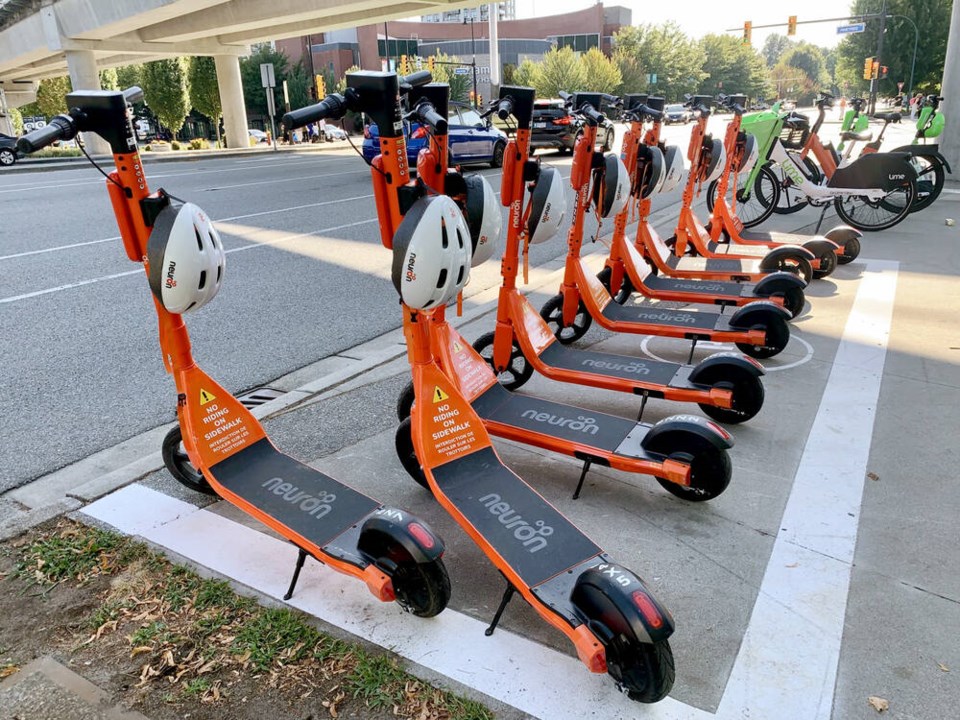It’s been a month since shared e-scooters and e-bikes launched in Coquitlam’s City Centre.
And, by all accounts, the micromobility program has been a success — and may be expanding to other high-traffic areas, with the aim to cut down on the number of vehicle rides in the city.
Last month, city staff told council how micromobility (e.g., bicycles, scooters, skateboards, self-balancing boards and their electrified forms) is becoming more popular with commuters and will require separated lanes around busy locations in Coquitlam, such as at SkyTrain stations.
They’re proposing a Micromobility Network by 2050 to replace the current cycling network, gradually expanding the micromobility infrastructure over time — largely over flat surfaces.
Besides the partially completed Guildford Greenway, along Guildford Way in City Centre, Coquitlam is also building or has designated micromobility sections and greenway routes along:
- Lougheed Highway (off Dewdney Trunk Road)
- Lougheed Highway (at Barnet Highway)
- Pipeline Road (until David Avenue)
- Regan, Grover and Smith avenues
- King Albert Avenue
- United Boulevard
And micromobility lanes are being considered for the rapidly evolving western neighbourhood of Oakdale (north of Burquitlam), involving Elmwood Street, Kemsley Avenue and Glenayre Drive, according to a report before the July 18 Finance and Strategic Priorities standing committees.
As for the two companies currently providing e-scooters and e-bikes in the city’s 18-month pilot program in Coquitlam City Centre, their spokespersons say they’re thrilled with the results.
Neuron, which has the orange-coloured vehicles and launched before Canada Day (July 1), says riders in Coquitlam have travelled close to 50,000 kilometres over the past month.
“Rider and resident response to the program has been overwhelmingly positive and we will continue to assess feedback to improve the riding experience where we can,” Isaac Ransom, head of corporate affairs for Neuron Mobility, told the Tri-City News in a statement.
And Sonia Kandola, director of government relations at Lime, said her company has seen nearly 5,000 rides, “which is an excellent start as we work to increase our fleet size and meet the significant demand Coquitlam has for shared e-scooters and e-bikes,” she said.
Neither service provider said there has been serious injuries in the Coquitlam pilot program.
Meanwhile, city staff have put together an to give micromobility riding tips, and offer educational workshops with HUB Cycling; the next sessions will be held in Lot E of Town Centre Park (1299 Pinetree Way) on Aug. 16 and Aug. 28, from 5 to 7 p.m.
Douglas McLeod, Coquitlam’s director of transportation, said with more than 16,000 trips in the first month of the pilot program, the city is averaging about 600 trips a day. “The city has received only two dozen service requests with feedback ranging across concerns with operations, speed, accessibility and sidewalk parking,” he told the Tri-City News on Monday.
In response, he said, the city has:
- implemented slow zones or no-go zones in private parking lots
- adjusted preferred parking sites outside the Town Centre zone
- looked for more dockless micromobility parking spots
- increased signs, surface stencils and green conflict paint at intersections

